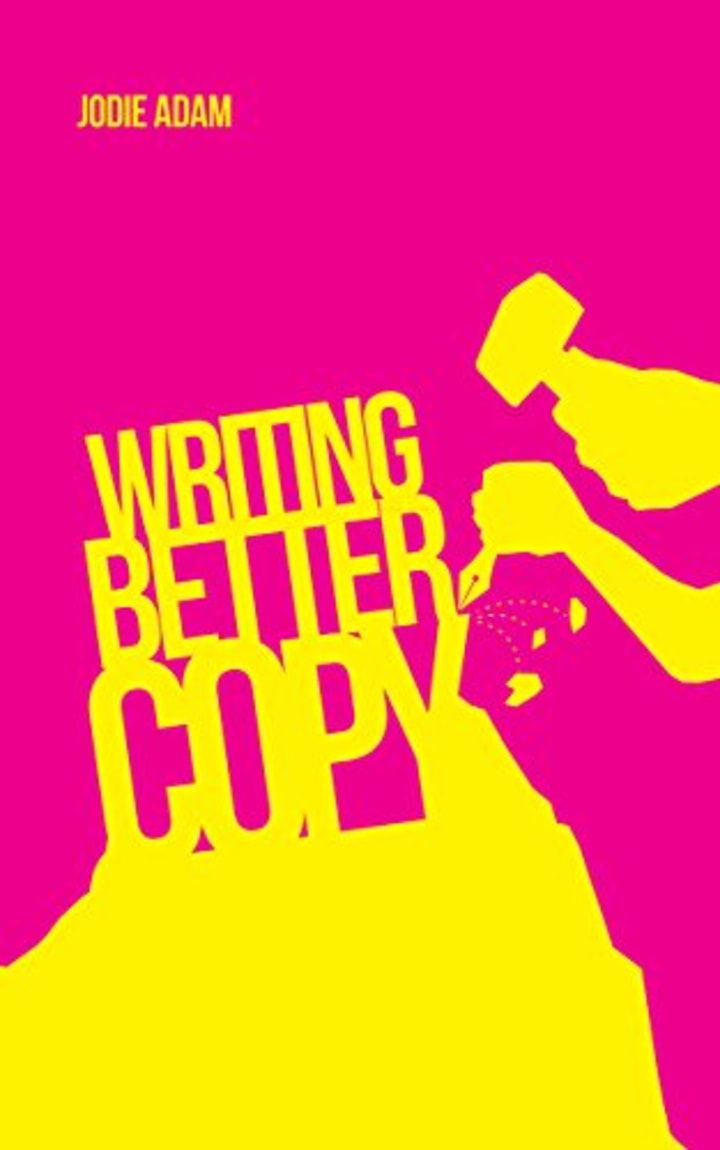Why writing a book was so important to me
What I learned from writing a book

I had a few reasons for deciding to write a book about copywriting. The first was personal fulfilment: it was a good way to consolidate what I had learned. Secondly, professional recognition: I was looking for a new job at the time and a book is far more impressive than a CV. And finally, vanity: having an actual printed book with your name on the front feels awesome.
The power of words to influence people has always fascinated me. Ever since I first struggled to decode the tricky squiggles on the page at school, they have intrigued me with their ability to weave stories and enrapture readers. Together words build stories and stories abound in their relentless capacity to rile emotions, excite the imagination and exemplify the extraordinary.
Such a passion for words inside a child with dyslexia may seem like a disastrous combination; no sooner had I been tempted by words than I was betrayed as I tried in vain to grasp their meaning. Yet despite the problems I had learning to read and write, I never let words get the better of me.
This obsession led to a lifelong mission to acquire books to occupy my shelves and an ever-sneaking dream that one day I would be able to place something I had written on those bookshelves, and maybe other people would as well.
A book is the physical representation of knowledge, a papery monolith built purely with the power of the mind. Handing someone a book you’ve written is like handing them a piece of your brain. Writing is hard, but when you do enough of it in the right way to be able to call it a book, you finish up a tangible representation of your effort.
After six years working as a copywriter, I decided I was ready to take all the knowledge I had acquired and put it together into a book of my own. While I might dream of writing the next New York Times bestseller, I knew that I had to start with what I knew, and what I knew was copywriting.
Marketing copywriting is the essence of communicating through words. It is the absolute precision of word choice and sentence construction. No word is ever superfluous, every single one must work hard to convince potential customers of what you need them to do. Words have power and copywriters wield that power with measured precision.
When crafting copy, succinct word choices blend together to form subtle messaging designed to evoke not merely a desire in the reader but the conviction that they absolutely need to buy your product. Fiction spirits you away as the author constructs a picturesque path to lead you willing to their conceived destination. Copywriting transports you instantly to where you need to be, giving you all the necessary information and reassuring you that your decision is the right one.
This is the fascination copywriting holds for me. While the woven intricacies of literature are wonderful to stroll through, as a dyslexic, I prize efficiency of communication too. And it was this craving for simplistic communications that drove me to write a book where I could bring all my knowledge on the subject together.
So, one evening, I sat down in front of my laptop, put my headphones on, turned my phone off and was all ready to begin my magnum opus. Fifteen minutes and three lines later, I abandoned the idea and went to bed.
For the next six months, I continued reading and learning about copywriting. I thought a lot about writing, but I could never get my thoughts into a coherent order to actually do anything.
That’s when I realised:
My brain doesn’t do things in a coherent order.
It was one of the first pieces to the puzzle that would eventually lead to me discovering that I am dyslexic. But as much as I wanted to get my ideas about copywriting down on the page when it came to writing them in a linear fashion, it was like trying to organise a parade of cats.

So, what did I learn about writing a book?
Writing a book doesn’t have to be a mammoth task
While all aspiring writers might want to churn out a George RR Martinesque tome that could probably double as a doorstop, a 100-page book is also a huge achievement. If you can tell your story or get your message across in 15,000 words, then say it in 15,000 words. This was an important revelation since copywriting celebrates the brevity of communication and superfluous words are the antithesis of efficiency.
Know what type of writer you are
Everyone writes in their own way. Some people can just sit in front of an empty screen and start writing. I’ve heard them called seat-of-your-pants writers or Pantser. I’ve tried it, and it’s not for me. I need a structure to hang my words on, otherwise, I end up filling the page with hollow words.
Build a compost heap
Neil Gaimon says writers should build a compost heap of their writing, and that’s what I did. I went through every book I could find about copywriting, compiling the pearls of wisdom from experienced copywriters together with the knowledge I had accumulated over the years. I threw them all indiscriminately into one huge, cluttered Google doc.
Give yourself a deadline, 85 per cent will do
Deadlines work, they give you something to aim for. You might never meet them, but they help organise your time. I set myself an 85% deadline for the end of July. Eighty-five per cent is a good amount. It’s almost finished but still leaves you a fair bit of wiggle room. And besides, 85% done is better than 100% not done.
Working towards this deadline, I carried on reading and collecting snippets for my compost heap. Halfway through June, I had a vast, sprawling document of all I had learned. It was an immense unregulated behemoth of knowledge and quotes which filled me with a mixed sense of pride and trepidation.
You know when you know enough
While the notion that the “only true wisdom comes from knowing you know nothing” is sort of true, it’s also true that when you’ve read so many books on something they start repeating themselves, you probably know enough. And that’s where I got to when I decided it was time to organise my compost heap and start writing.
Time to get organised
For the next few weeks, I was copying and pasting from here to there as I sorted the information into various documents, which for convenience’s sake, at this point I simply titled one to nine. As each one started to take shape and I could begin to see what it was going to be about, I gave them more appropriate titles, such as “AIDA, Attention, Interest, Desire, Action”, “write as you speak”, “sell the sizzle, not the steak”, and “keep it simple stupid”.
This is when the majority of the actual writing took place. As I ran through each document, again and again, stitching together ideas and creating examples, I was also moving paragraphs around and ensuring each chapter flowed naturally. But a book is more than simply a collection of information. Just like humans, books need a personality, a unique tone that makes them special. As I shaped and structured my book, I struck upon the notion that copywriting was like sculpting. The initial process of doing research is like a sculptor hewing his rock, then the actual writing is the initial carving phase before finally, the meticulous process of editing is the chipping away at the rock, perfecting it.
“I love deadlines. I love the whooshing noise they make as they go by” - Douglas Adams
I’d like to say that I stuck to my loose 85 per cent deadline, but that just simply wouldn’t be true. I did, however, carry on chipping away at my wordy sculpture and eventually, after much rewriting, editing and finessing, I was ready to combine each of my separate chapters back into one long document. And it felt great. It may have only run to 12,000 words, but it was the sum of my hard work, and together with a contents page it was beginning to feel like a real book.
What’s in a name?
Nearly finished, I may have been, but I still didn’t have a title. It needed to be reflective of the content, obviously, and since I had developed the theme of comparing writing to sculpting, I initially thought to call it “Sculpting Better Copy”. The problem with this is, it was trying to be too clever. While I liked it, I knew no one would be searching for it, and that’s what matters. A title needs to tell people and search engines exactly what the book is about. The last thing I wanted was a bunch of disgruntled sculptors coming after me armed with chisels complaining about how I had mislabelled my book.
Since simplicity is one of the fundamentals of copywriting, I decided the best title would be the simplest and opted for “Writing Better Copy”. I would let the cover design take care of the sculpting metaphor.
Judge a book by its cover
The cover is the first thing anyone sees of your book and accounts for the majority of purchasing decisions. I needed to make sure mine was both eye-catching and an accurate representation of what was inside. Using just two powerful colours, my designer managed to encapsulate the idea of sculpting words from rock in an eye-catching way.

If you write it, they will buy it
Writing Better Copy is available on Amazon. Soon after posting it, I found out that the easy part of any book is the writing process. After that comes the impossible job of marketing and actually getting people to buy it. I hope, if you found this journey interesting, you will consider taking a look at the book itself and maybe even leaving a review if you like it.
Support for this book would leave me more time to focus on other writing projects. Over the years, I have developed a lot of ideas around developing a tone of voice while writing and how companies write in a particular way to make their brands feel like an actual person is speaking.
As I mentioned earlier, I am dyslexic (you wouldn’t believe the number of times I proofread this article) and I have also written a memoir of my struggles at school and at work. A larger readership would allow me to promote this as well. I am fascinated by the way we use words to communicate but also by how we can simplify communications to make sure important messages are available to all sections of the public, even those for whom reading might be more of an issue.
Reflections
Was this the most effective way to write a book? Probably not, but that was the way I did it and as Neil Gaiman said "You never learn how to write a novel. You just learn how to write the novel you are on".
About the Creator
Jodie Adam
My advice to you is get married: if you find a good wife you'll be happy; if not, you'll become a philosopher.
- Socrates
www.jodieadam.com






Comments
There are no comments for this story
Be the first to respond and start the conversation.